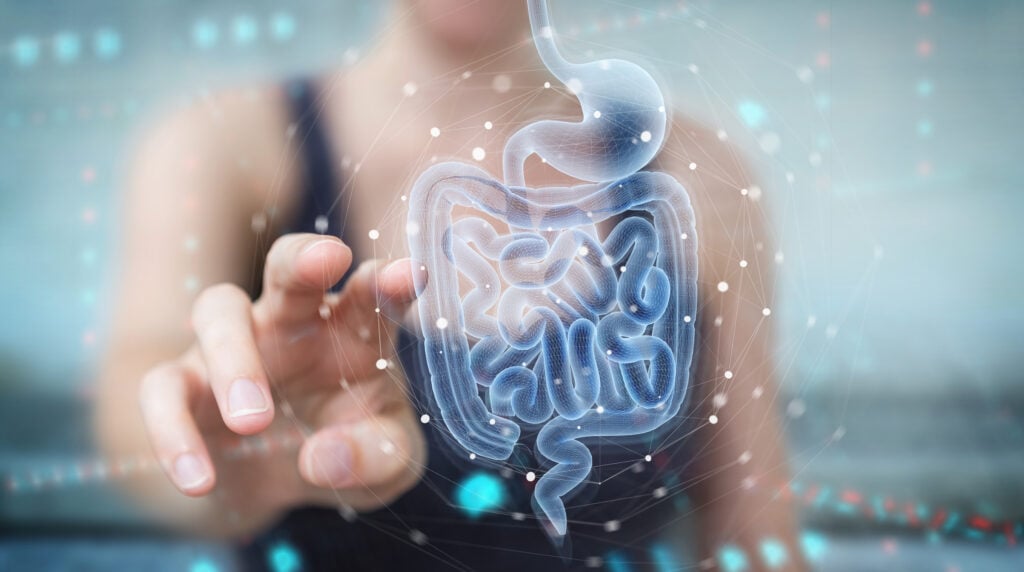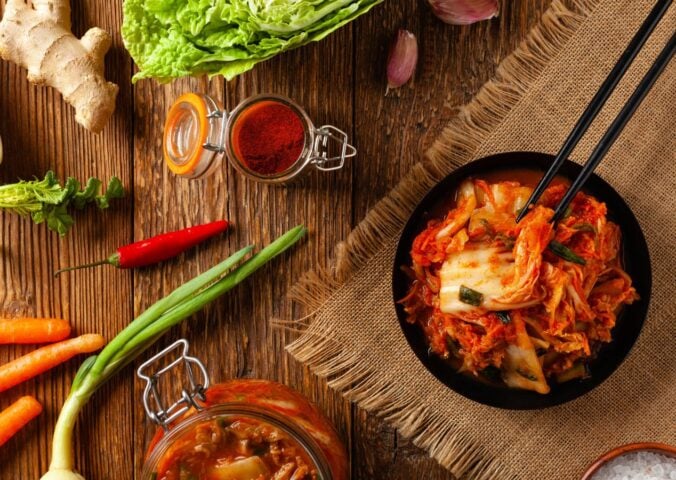We rarely pay much attention to our gut health until we have to.
Conversely, we know how our mental state can affect our digestion. How often have you ever said you have a ‘gut feeling’ about something?
Both eating and feeling well have a positive impact on our guts. Stress, sadness, and an unhealthy diet can harm it.
What is a healthy gut?
Your gut is a world in itself, inhabited by trillions of bacteria. They’re not all good and not all bad, it’s the balance that is key. And what we eat determines which bacteria thrive and which don’t. You can make the good ones multiply and the bad ones starve – pretty magical!
All these bacteria are also known as the gut microbiome and altogether can weigh up to two kilograms! No two people have exactly the same gut bacteria as their composition is as individual as your fingerprint.
Gut bacteria regulates so much of our body’s health functions.
“A huge proportion of your immune system is actually in your GI tract,” according to Dan Peterson, assistant professor of pathology at the Johns Hopkins University School of Medicine. “The immune system is inside your body, and the bacteria are outside your body.”
According to Peterson, certain cells in the gut lining continuously excrete antibodies into the digestive tract. “That’s what we’re trying to understand,” he says. “What are the types of antibodies being made, and how is the body trying to control the interaction between ourselves and bacteria on the outside?”
Diet matters greatly here. Depending on what you eat, your gut bacteria will differ substantially. Meat-eaters tend to have the most harmful bacteria in their guts. On the other hand, meat reducers, pescatarians, and vegetarians have a somewhat better balance. Those who eat a predominantly vegan diey may have the most beneficial bacteria, according to a growing body of research.
People with a higher number of harmful bacteria may be more at risk for degenerative diseases such as rheumatoid arthritis, heart disease, and some types of cancer.
TMAO
Undesirable gut bacteria that are plentiful in meat use a compound – carnitine – as an energy source. That produces trimethylamine-N-oxide (TMAO) as a waste product.
TMAO is a dangerous substance that stimulates the build-up of cholesterol plaques in blood vessels, greatly increasing the risk of heart disease. Interestingly, vegans’ gut bacteria produce no TMAO, or only miniscule amounts, when exposed to carnitine.
According to a 2018 study published in the European Heart Journal, a diet rich in red meat significantly increased TMAO levels. Subjects were studied by their dietary preferences. The red meat group saw higher TMAO levels than those who didn’t consume red meat. The study found chronic red meat consumption enhanced TMAO production and “reduced the kidneys’ efficiency of expelling it,” according to the Cleveland Clinic. “Both enhanced production and reduced elimination caused by a red meat diet contribute to elevation in TMAO levels, which has been linked to the development of atherosclerosis and heart disease complications.”

IBDs
There are many types of irritable bowel diseases (IBDs). The most common include Crohn’s disease, IBS, and ulcerative colitis. Every case is different when it comes to trigger foods, but they all tend to have one thing in common.
According to multiple studies, animal protein makes things worse. It is due to the higher amount of sulphur it contains compared to plant protein. IBD sufferers who avoid meat, fish, and eggs (all sulphur-rich) will likely experience some relief. For some, sulphur-rich foods such as garlic, cabbage, or beans, may cause issues, even though they contain less sulphur than meat.
A plant-based diet may not be the answer to all IBD issues, but it has been fairly successful in Crohn’s disease remissions. Some people with IBDs do exceptionally well on a low FODMAP diet, which excludes certain types of fermentable carbohydrates. A plant-based low FODMAP diet may be worth discussing with your doctor if you suffer from any of these diseases.
Prebiotics
Prebiotics is a term used for foods that provide the best fodder for your good gut bacteria. In short, it’s what your gut bacteria eat. Prebiotics encourage the bacteria to multiply – and you benefit from the result. In general, all fibre-rich and starchy foods are prebiotics – fruit and vegetables, pulses, whole grains, and nuts and seeds. Our gut bacteria feast on them and produce short-chain fatty acids (SCFAs) in the process.
SCFAs can be used by our intestinal cells for energy but most importantly, they have anti-inflammatory and anti-cancer effects. Butyrate is one of them and is particularly beneficial, having been shown to significantly reduce the risk of colon cancer. It may be one of the reasons why vegans have much lower rates of this disease compared to meat-eaters.
Probiotics
Probiotics are live bacteria that help to populate our guts and establish a better ratio of good to bad bacteria. They are naturally occurring in fermented products such as yoghurt, tempeh, kimchi, miso or kombucha.
Probiotic supplements can be useful in specific situations, such as when you’ve taken a course of antibiotics. If you’re healthy and have a varied diet based around fibre-rich wholefoods, there’s no need to take these supplements.
What to do after antibiotics
Antibiotics can help us beat bacterial infections but they also kill a lot of good gut bacteria in the process. To foster good gut bacteria, eat foods they like (prebiotics) and bring them some friends in fermented products (probioticts).
Whilst you may be craving cup-a-soup and chocolate, these will not help your guts to recover. Instead, be sure to eat wholefoods. Add some fermented foods and even a probiotic supplement and you’ll bounce back in no time.
Junk food effect
There’s no shortage of tempting junk food out there. And while thatmight be good for convenience and comfort eating, but it’s bad for our guts. Processed meat and other processed foods don’t feed the good bacteria and may throw your guts off-balance.
Indulging every once in a while is okay; but for problematic’ guts, a diet rich in whole grains, pulses, fruit, and vegetables may be optimal.
Good news
The great thing about our guts is that you can change your gut bacteria simply by choosing what you eat. The microbiome won’t change overnight, but a healthy diet can bring a noticeable difference within weeks.
Your gut bacteria may need a bit of time to catch up to any major diet shifts. That’s why people may experience “digestive adventures” when they change their diets; a new balance is established and your gut becomes happy and healthy.
This article was first published by Viva!




